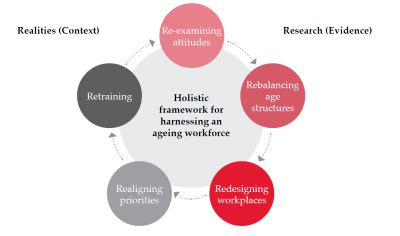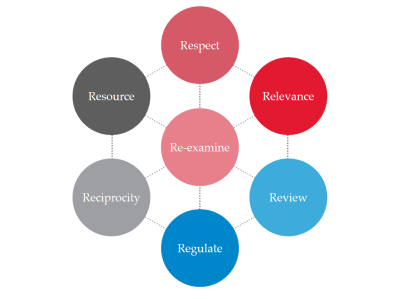In 2018, Associate Professor Helen Ko was invited by the International Labour Organisation (ILO) to contribute a chapter regarding local older workers and skills development for its publication, Skills and the Future of Work: Strategies for inclusive growth in Asia and the Pacific, in preparation for its centennial anniversary. In the chapter, Prof Ko discusses the various challenges experienced by Singapore's ageing workforce, based on studies conducted by herself and other researchers. She also proposes several measures that were derived from her research and consulting experience, to tackle these outstanding issues in the field.
The ageing population in Singapore: Related policies and inadequacies
"By integrating older workers into workplaces, regardless of socioeconomic strata and gender, we may tap into the unique talents and skills that the mature workforce has to offer." Associate Professor Helen Ko |
Asia is experiencing a rapidly ageing population. In 2017, there were 549 million persons aged 60 and above in the continent. This constituted 57% of the global older population, and the number was estimated to increase to 1.3 billion persons, or 61%, by 2050[1] . This increase in the mature aged population led to the growing number of older adults in the workforce.
In Singapore, the workforce's median age rose to 43 years in 2017[2] , while 23.8% of the workforce is aged 65 and above. The number of employed residents aged 65 and above was 145,000 in 2018[3] .
"While this situation does challenge our economic survival, it also presents valuable growth opportunities," Prof Ko explains. "By integrating older workers into workplaces, regardless of socioeconomic strata and gender, we may tap into the unique talents and skills that the mature workforce has to offer."
Singapore Government has implemented four key initiatives in recent years to achieve these objectives: SkillsFuture, the Tripartite Alliance for Fair and Progressive Employment Practices (TAFEP), the Work-Life Works! Portal and WorkPro[3] . These policies have yielded considerably positive results and led to an increase in gainfully employed mature workers. There has also been a reduction in age-related workplace discrimination.
Although the efforts to promote skills acquisition and employment of older adults are commendable, previous studies carried out by Prof Ko and other researchers have revealed that the policies are inadequate in several areas. For example, there was insufficient evidence to indicate that individuals enrolled in courses that were aligned with their needs and passions.
"This signifies that the extent to which the SkillsFuture movement has contributed to developing the skills, passions, and potentials of older adults, particularly those in the lower-economic stratum remains unclear."
She also discovered that the WorkPro scheme (a scheme to encourage employers to implement age-friendly workplaces which officially ended on 1 April 2020) had produced less than stellar results, since many local companies were still reluctant to employ older workers or adopt a flexible working scheme, provision of funds by the government notwithstanding.
"We need to assess the initiatives more critically against our goals of skills development and to promote inclusive growth for all workers and individuals in Singapore so that we could address these discrepancies."
In the chapter, Prof Ko also emphasised the need for companies to re-examine existing attitudes towards older employees.
"In the context of an ageing workforce in Singapore and the moderation of the inflow of foreign workers, it is imperative for companies to harness the experience and potentials of older workers. To achieve that, companies would need to align their operational requirements to accommodate mature employees' needs and responsibilities. One way to do so is to improve the design of workplaces, so as to bolster work abilities," she suggests. "Besides, employers should ensure that all older persons will benefit from the skills-training activities, regardless of their wage and skill levels."
Most importantly, employers should implement policies to efficiently resolve and eradicate the prejudices that mature employees encounter for a more harmonious working environment.
The holistic framework and the 7Rs Principles
Based on her research and consulting experience with companies pertaining to issues relating to ageing workforce management, Prof Ko proposed a holistic framework in the chapter (Fig.1) to address the shortcomings of the current schemes delineated above. The framework encompasses five strategies that are inter-related. They are: (1) re-examining attitudes, (2) re-balancing age structures, (3) re-designing workplaces and environments, (4) re-aligning business priorities to match those of older workers, and (5) re-training older workers. Companies can adopt this holistic framework to design and implement appropriate and effective measures to create a more inclusive workplace for their mature employees and safeguard their rights. This will motivate older workers to continue working and contribute to Singapore's economic development.

Fig.1: Holistic Framework for harnessing an ageing workforce (Ko, 2018)
The framework highlights the importance of re-training older workers (strategy 5). However, many of these individuals, particularly the less-educated, are less likely to enrol in training courses. As a result, most of them continue to hold low-skilled jobs with meagre incomes. Research revealed that the low participation rate of training by the less-educated older adults is due to a lack of self-confidence, despite their interest and capacities. Studies conducted by SUSS's Institute for Adult Learning demonstrated that workers aged 45 or older are adaptable and willing to learn[1] . Moreover, there is evidence to suggest that older workers' decisions to enrol in specific courses are influenced by the instructors' effectiveness in delivering the lessons. Hence, there is a need to improve the ways in which lessons are designed and delivered, to encourage enrolment and to promote engagement of older learners.
With her expertise in instructional design for older adults, and distilling from the findings of her award-winning, evidence-based model on teaching older learners, Prof Ko conceptualised and advocated the 7 Rs Principles (Fig. 2) to boost the instructors' pedagogical performances. These principles are: respect for the older learners, to impart relevant and practical knowledge, frequent reviews, regulate instructional speed and complexities, establishing a reciprocal instructor-learner relationship, leveraging learners' capabilities as resources, and re-examining instructors' existing attitudes (e.g. unconscious biases) towards their older learners. By applying these principles, a supportive and conducive learning environment can be created. This can in turn promote training participation and engagement of older learners.

Fig.2 :The 7 Rs Principles(Ko, 2018)
The 7 Rs Principles and the holistic framework complement each other and can be implemented together, so that companies and their mature employees can enjoy the synergistic benefits of both improved adult learner pedagogy, as well as an environment that is conducive to and appreciates older workers' efforts.
Further actions to bolster current efforts
Besides proposing the holistic framework and the 7 Rs Principles to address employment and societal issues experienced by mature workers, Prof Ko also recommends the following actions to bolster current efforts, based on her experience heading several eldercare organisations and advising governmental departments:
- The government should disseminate factual evidence and present more positive examples of well-performing seniors. Management could also highlight the contributions of older workers at company functions or through in-house publications.
- Employers should, whenever possible, assign appropriate jobs to their mature staff based on their experience and expertise.
- Businesses could conduct reflection exercises so as to offer opportunities for their employees to examine their subconscious biases and attitudes towards older workers and compare these against research findings. They should then address the prejudices uncovered and resolve them to create a harmonious working environment.
- Employers should establish multi-generational project teams. They should also develop corporate guidelines for an inter-generational human resource policy.
- Finally, employers should take the initiative to create conducive workplaces to sustain the work abilities of employees. For example, Prof Ko suggested that they could arrange healthcare activities such as general health screenings, and organise educational programmes on nutrition and stress management.
Conclusion
An ageing workforce is an unavoidable phenomenon in Singapore. The Singapore Government and corporates need to work together and make the necessary changes and/or adjustments to manage the issues precipitated by an ageing workforce. With her wealth of research knowledge and consulting experience, Prof Ko designed the holistic framework and the 7Rs Principles to address the challenges experienced by mature workers in the workplace and in society. Critically, employers need to foster a mutually beneficial and reciprocal relationship at the workplace, and harness older employees' capabilities, to achieve win-win solutions for both the employers and the employees. Ultimately, creating workplaces that facilitate ageing workers to succeed will better position Singapore to leverage the longevity dividend.
References:
[1] Institute for Adult Learning (2017): Promoting and supporting lifelong employability for Singapore's workers aged 45 and above
[2] Department of Statistics (2017): Population and Population Structure - Latest Data. Singapore
[3] Statista (2020): Aging population of Singapore-Statistics and Facts
Featured Publication by Prof Helen Ko:
Ko, H. (2018). Holistic framework for harnessing an ageing workforce in Singapore. Skills and the Future of Work: Strategies for Inclusive Growth in Asia and the Pacific, 100–125. https://www.ilo.org/wcmsp5/groups/public/---asia/---ro-bangkok/---sro-bangkok/documents/publication/wcms_650239.pdf
Figure 1 & Figure 2: Ko, H. (2018). Holistic framework for harnessing an ageing workforce in Singapore. Skills and the Future of Work: Strategies for Inclusive Growth in Asia and the Pacific, 100–125. https://www.ilo.org/wcmsp5/groups/public/---asia/---ro-bangkok/---sro-bangkok/documents/publication/wcms_650239.pdf
The Centre for Applied Research conducted the interview with Prof Helen Ko in August 2020.
For enquires about this article, please contact CFAR via email.